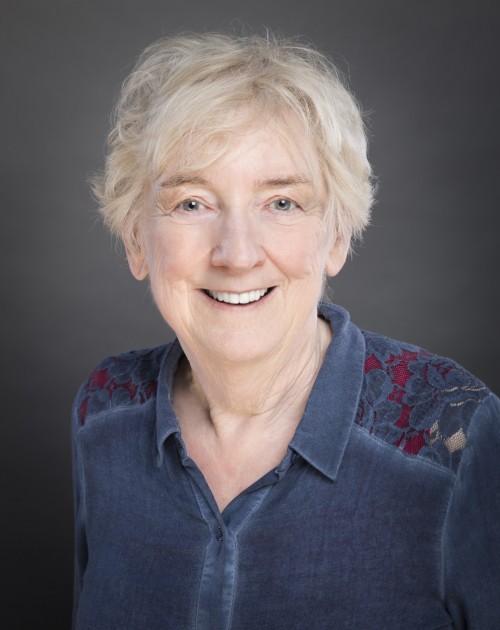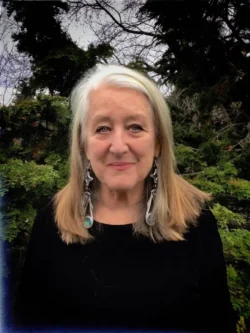‘All life is sacred’
Always on Call: Adventures in Nursing, Ranching, and Rural Living
by Marion McKinnon Crook
Victoria: Heritage House, 2024
$26.95 / 9781772034691
Reviewed by Linda Rogers
*

Anyone who has looked up, or had a near death experience, associates angels with light. Some of us, who can bear it, continue to watch Satan aka the angel of light’s comedic fall from grace through the cyberclouds where alternate truths are created (shrieking “Non servium” with a Brooklyn accent).
When we look around, we see the antidote: those dedicated to service. For example, there are nurses who carry on in spite of everything we know about cruelty and greed, and, yes, misogyny, the creep’s response to maternal behaviour, the ultimate service.
Some go further and take their mothering to killing fields and hospitals, the dark streets inhabited by discarded humans. That is service and sometimes we call it nursing, a real vocation. To them, our body fluids: blood, vomit, and pus are sacraments they handle with respect, because, like beautiful ideas, they come from us. All life is sacred. “Everything that comes from the body is beautiful,” says Diane Weiss in “Little Man Tate,” words we remind ourselves to remember.
Marion Crook’s book release is timely because none of us should forget that nurses risked their lives to guard our health during the recent pandemic. They were honoured with the banging of pots every night at seven o’clock until politics interfered with honest appreciation, limiting the help they needed, and now they are honoured by a book written by one of their number.
During the mid-sixties, Crook, a shepherd among women, takes her clinical gift for multitasking with due diligence to the Cariboo, where she farms, nurses, and mothers while many of her contemporaries pursued sex, drugs, rock and roll, and social protest. She chose service, while the devil tumbled again and again.
In language clear as a pane of glass (our exemplary friend Carol Shields’s desideratum for good writing), Crook manages her flock of sheep, patients, and children in a world of chaos, never a stale concept as service continues to be the antidote.

When we think of a good read we usually imagine fiction, suspenseful arcs that draw us into resolution, maybe redemption. This book is (surprise) a good read because Crook makes the ordinary extraordinary with every small event contributing to our understanding that life itself is a miracle.
She compels in tiny suspenseful moments. Will the car start? Will all in a litter of a dozen piglets survive? Will blood tell a happy story under the microscope? We live every single hesitation with her as she spins her extraordinary tale of the ordinary. Not every game is the high drama of cops and robbers, cowboys and Indians, a concept she puts the lie to, letting us know how subtle racism undermines Indigenous health and cultural practice through innuendo.
Back to the Fall, Eve taking credit again. Women are dirty, Native women are especially dirty. This is how evil disrupts matriarchy and the selfless lives of nurses and medicine women, many of whom have been burned as witches.
Crook, the adoptive mother of two children, one of whom is Indigenous, is sensitive to the nuances of prejudice, the subtle and blatant bigotry that forms children’s responses to the world and their surfeit or deficit of self-esteem. She draws maps for navigating the life of a working parent and negotiating assault from the ignorant, many of whom she is serving.
As a mother she resists egregious attacks on the dignity of her children. As a nurse, she uses those experiences to show us the better path to living in health and harmony.
What is astonishing is her recall for detail. Some of it, who knows, may be confabulation that honestly serves the story. Truth is in the details and she builds on them to create shared memories that are as fascinating as fiction.
What makes a good nurse, empathy, good recall, and perfectionism, also makes a good storyteller. In one story, she tells of a pizza party she held for fellow nurses at her farm home. When one of her fellow workers noticed her spices were in alphabetical order, she diagnosed obsessive compulsion. “It was only after they left I noticed Sophie had systematically rearranged my spice cabinet so nothing was in alphabetical order.”
Nurses don’t get to make mistakes. This book is written as carefully as Crook navigated intransigent bureaucracy, patients, and children. You would be glad to have her by your sickbed and to have her book in bed with you as you read yourself toward dreams of a tidier future.
*

Linda Rogers, a Canadian People’s Poet, is better known for whopping a bigoted cop with her purse. She enjoyed this book of resistance to egregious behaviour. [Editor’s Note: She has reviewed books by Tim Schouls, Michelle Good, Marilyn Bowering, Taro Zion Joy, Heather Menzies, and Brandi Bird for The British Columbia Review.]
*
The British Columbia Review
Interim Editors, 2023-25: Trevor Marc Hughes (non-fiction), Brett Josef Grubisic (fiction)
Publisher: Richard Mackie
Formerly The Ormsby Review, The British Columbia Review is an on-line book review and journal service for BC writers and readers. The Advisory Board now consists of Jean Barman, Wade Davis, Robin Fisher, Barry Gough, Hugh Johnston, Kathy Mezei, Patricia Roy, and Graeme Wynn. Provincial Government Patron (since September 2018): Creative BC. Honorary Patron: Yosef Wosk. Scholarly Patron: SFU Graduate Liberal Studies. The British Columbia Review was founded in 2016 by Richard Mackie and Alan Twigg.
“Only connect.” – E.M. Forster
One comment on “‘All life is sacred’”
Dear Linda Rogers, I am humbled by such an insightful and thoughtful review—expressed so beautifully. Thank you. Marion McKinnon Crook